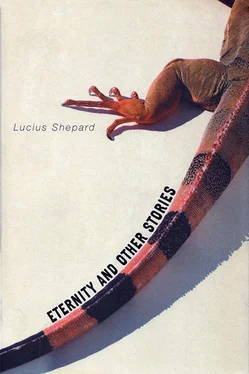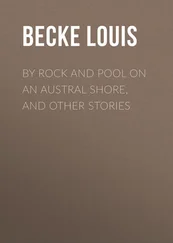Люциус Шепард - Eternity and Other Stories
Здесь есть возможность читать онлайн «Люциус Шепард - Eternity and Other Stories» весь текст электронной книги совершенно бесплатно (целиком полную версию без сокращений). В некоторых случаях можно слушать аудио, скачать через торрент в формате fb2 и присутствует краткое содержание. Город: New York, Год выпуска: 2005, ISBN: 2005, Издательство: Thunder's Mouth Press, Жанр: Фантастика и фэнтези, prose_magic, на английском языке. Описание произведения, (предисловие) а так же отзывы посетителей доступны на портале библиотеки ЛибКат.
- Название:Eternity and Other Stories
- Автор:
- Издательство:Thunder's Mouth Press
- Жанр:
- Год:2005
- Город:New York
- ISBN:978-1-560-25662-5
- Рейтинг книги:5 / 5. Голосов: 1
-
Избранное:Добавить в избранное
- Отзывы:
-
Ваша оценка:
- 100
- 1
- 2
- 3
- 4
- 5
Eternity and Other Stories: краткое содержание, описание и аннотация
Предлагаем к чтению аннотацию, описание, краткое содержание или предисловие (зависит от того, что написал сам автор книги «Eternity and Other Stories»). Если вы не нашли необходимую информацию о книге — напишите в комментариях, мы постараемся отыскать её.
“Lucius Shepard’s stories a jungles — densely alive, sometimes mysterious, often gorgeous, and always dangerous.” — Katerine Dunn, author of Geek Love
Eternity and Other Stories — читать онлайн бесплатно полную книгу (весь текст) целиком
Ниже представлен текст книги, разбитый по страницам. Система сохранения места последней прочитанной страницы, позволяет с удобством читать онлайн бесплатно книгу «Eternity and Other Stories», без необходимости каждый раз заново искать на чём Вы остановились. Поставьте закладку, и сможете в любой момент перейти на страницу, на которой закончили чтение.
Интервал:
Закладка:
What Causey said made me no more certain of my estate, and after he returned to his cell I remained awake, staring at the mysterious reach of the old prison that lay beyond the ninth stair, the dim white lights and anthracitic cell mouths. Everything I knew about Diamond Bar was cornerless and unwieldy, of a shape that refused to fit the logic of prisons, and this gave me cause to wonder how much more unwieldy and ill-fitting were the things I did not know. I was accustomed to prison nights thronged with hoots, cries, whispers, complaints, screams, an uneasy consensus song like the nocturnal music of a rain forest, and the compressed silence of the place, broken intermittently by coughs and snores, inhibited thought. At length I slept fretfully, waking now and again from dreams of being chased, hunted, and accused, to find the silence grown deeper, alien and horrid in its thickness. But toward dawn—one I sensed, not witnessed—I woke to an outcry that seemed to issue from beneath the old prison, such a prolonged release of breath it could only have been the product of awful torment or extreme exaltation… or else it was the cry of something not quite human, expressing a primitive emotion whose cause and color is not ours to know, a response to some new shape of fear or a tidal influence or a memory from before birth, and following this I heard a whispering, chittering noise that seemed to arise from every quarter, like the agitated, subdued congress of a crowd gathered for an event of great and solemn gravity. While that chorus lasted I was full of dread, but once it subsided, almost stricken with relief, I fell into a black sleep and did not wake again until the shadows, too, had waked and the first full day of my true incarceration had begun.
During those early months at Diamond Bar I came to understand the gist of what Ristelli, Causey, and the baldheaded man had tried to tell me. Eventually one found what was suitable. Things came to you. Trust your instincts. These statements proved to be not the vague, useless pronouncements I had assumed, but cogent practicalities, the central verities of the prison. Initially I behaved as I had during my early days at Vacaville. In the dining hall, an appropriately cavernous room of cream-colored walls, with the image of a great flying bird upon the ceiling, dark and unfigured, yet cleanly rendered like an emblem on a flag… in the dining room, then, I guarded my tray with my free arm and glanced fiercely about as I ate, warning off potential food thieves. When I discovered that the commissary was, indeed, a free store, I took to hoarding cigarettes, candy, and soap. It was several days before I recognized the pointlessness of these behavioral twitches, several weeks before I grew comfortable enough to forego them. Though I was not a heavy drug user, on those occasions that I grew bored, prior to beginning my work, I had no difficulty in obtaining drugs—you only had to mention your requirements to one of several men and later that day the pills or the powder would appear in your cell. I have no idea what might have occurred if I had developed a habit, but I doubt this was a problem at the prison. It was clear that the men on my block were all either above average in intelligence or skilled in some craft, or both, and that most had found a means of employing their gifts and skills that left no time for recreational excess. As to the men housed in the cellblocks below the eighth stairway and how they managed things—of them I knew little. The men of different blocks rarely mingled. But I was told that they had a less innate grasp of Diamond Bar’s nature than did we. Consequently their day-to-day existence was more of a struggle to adapt. In time, if they were not transferred, they—like us—would move into the old wings of the prison.
It did not seem likely that anyone could have less firm a grasp on the subject of Diamond Bar than I did, but I adapted quickly, learned my way around, and soon became conversant with a theory espoused by the majority of the men on my block, which held that the prison was the ultimate expression of the carceral system, a mutation, an evolutionary leap forward both in terms of the system and the culture that they believed was modeled upon it. They did not claim to understand the specifics of how this mutation had been produced, but generally believed that a mystical conjunction of event (likely a systemic glitch, an alchemy of botched paperwork and inept bureaucracy), natural law, and cosmic intent had permitted the establishment and maintenance of a prison independent of the carceral system or—so said the true believers—one that acted through subtle manipulation to control both the system and the greater society whose backbone the system formed. Though this smacked of Ristelli’s cant, it was not so easy to dismiss now that I saw Diamond Bar for myself. The absence of guards, of any traditional authority; the peculiar demeanor of the inmates; the comfortable beds, decent food and free commissary; the crossing of the river in lieu of ordinary official process; the man dressed as a guard whom everyone had seen and no one knew; the rapid fading of all tattoos; the disturbing dawn cry and the subsequent mutterings, a phenomenon repeated each and every morning—what could be responsible for all this if not some mystical agency? For my part, I thought the theory a fantasy and preferred another, less popular theory—that we were being subjected to an experimental form of mind control and that our keepers were hidden among us. Whenever these theories were discussed, and they were often discussed, Richard Causey, who had studied political science at Duke University prior to turning to a career of violent crime and was writing a history of the prison, would declare that though he had his own ideas, the answer to this apparently unresolvable opposition resided with the board, but that thus far their responses to his inquiries concerning the matter had been inadequate.
The board consisted of four inmates ranging in age from sixtyish to over seventy. Holmes, Ashford, Czerny, and LeGary. They met each day in the yard to, it was said, decide the important questions relating to our lives and—if you bought into the view that Diamond Bar was the purest expression of a carceral universe, the irreducible distillate of the essential human condition—the lives of everyone on the planet. To reach the yard it was necessary to pass through the old wing of the prison visible beyond the eighth stairway, and though in the beginning I did not enjoy the passage, made anxious by the gloomy nineteenth century atmosphere of the wing’s antiquated cells with their key locks and hand-forged bars, and the masses of rotting stone in which they were set, I grew accustomed to the sight and came to view the old sections of the prison as places of unguessable potential—it was there, after all, that I would someday live if I stayed at Diamond Bar. As I’ve noted, the prison straddled a ridge—the spine of the ridge ran straight down the middle of the yard. Most of the population would gather close to the walls or sit on the slopes, which had been worn barren by countless footsteps, but the members of the board met among the grass and shrubs that flourished atop the ridge, this narrow strip of vegetation giving the enclosed land the look of a giant’s scalp pushing up from beneath the earth, one whose green hair had been trimmed into a ragged Mohawk. Rising beyond the west wall, several iron girders were visible, evidence of the new wing that was under construction. The new wing was frequently referenced in conversation as being the panacea for whatever problems existed in our relatively problem-free environment—it seemed an article of faith that prison life would therein be perfected. Again, this struck me as fiction disseminated by whoever was manipulating our fates.
Читать дальшеИнтервал:
Закладка:
Похожие книги на «Eternity and Other Stories»
Представляем Вашему вниманию похожие книги на «Eternity and Other Stories» списком для выбора. Мы отобрали схожую по названию и смыслу литературу в надежде предоставить читателям больше вариантов отыскать новые, интересные, ещё непрочитанные произведения.
Обсуждение, отзывы о книге «Eternity and Other Stories» и просто собственные мнения читателей. Оставьте ваши комментарии, напишите, что Вы думаете о произведении, его смысле или главных героях. Укажите что конкретно понравилось, а что нет, и почему Вы так считаете.












